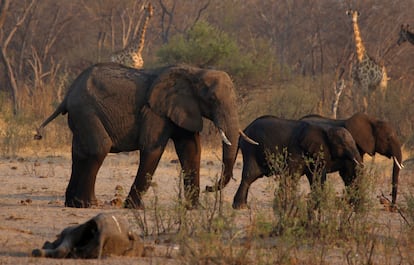Namibia to cull 723 animals including elephants, zebras and hippos to feed drought-stricken population
The measure is also aimed at reducing the risk of potentially dangerous encounters between humans and animals, which approach inhabited areas in search of grazing and water

On August 26, the Namibian government announced a plan to slaughter 723 wild animals, including 300 zebras, 83 elephants, and 30 hippopotamuses, whose meat will be used to feed the population affected by the severe drought that has been afflicting the country for the past year. The measure is also aimed at reducing the risk of potentially dangerous encounters between humans and animals, which approach inhabited areas in search of pasture and water, resources that are increasingly scarce due to the lack of rainfall. “With the severe drought situation in the country, conflicts are expected to increase if no action is taken,” the Environment Ministry said in a statement.
The 83 elephants to be culled are spread across 29 communal areas throughout the country, while the remaining animals are in five national parks. In all these areas there are “a sustainable number of specimens,” according to the ministry. In addition to the zebras, elephants and hippos, 60 buffalo, 50 impala, 100 blue wildebeest and 100 antelopes will also be slaughtered. The meat from the animals will go toward the drought relief program launched by the Namibian government, which will contribute “to the nutrition and poverty reduction of the population,” explains the communiqué.
The government has commissioned professional hunters hired by the ministry to slaughter the animals. As of Monday, August 26, 157 animals of different species had already been killed, resulting in the distribution of 56,875 kilograms of game meat. The Namibian government pointed out this is not the first time it has done something similar, and that for years it has been providing this food for celebrations of various kinds. At the same time, it confirmed the country’s total prohibition of uncontrolled hunting. “Poaching, among other forms of wildlife crime, will compromise the benefits that are intended to be obtained from our conservation work,” said the ministry.
“This action is necessary and is consistent with the constitutional mandate to use our natural resources for the benefit of citizens. It is also an excellent example that game conservation is truly beneficial. We are happy to be able to assist the country at this very difficult time and when it is absolutely necessary. Not only do Namibians benefit from the meat provided for drought relief, but the ministry has for years supplied meat for national, regional and traditional events in accordance with our policies and laws. The benefits of game meat also extend to communities in rural areas, especially those in conservation areas,” the statement said.
Last May, the Namibian government declared a state of emergency due to the worst drought this century, caused mainly by the impact of the El Niño phenomenon. Although according to the scientific association World Weather Attribution (WWA), the direct relationship between El Niño and climate change has not been proven, a study conducted in 2020 by the U.S. National Oceanic and Atmospheric Administration (NOAA) revealed that global warming due to greenhouse gases was going to intensify extreme El Niño events, such as droughts and torrential rains.
In any case, the drought in Namibia has pushed almost half of the population of some 1.4 million people into a phase three situation of food insecurity, or crisis, according to the Integrated Food Security Phase Classification (IPC) used by international organizations. As such, the government approved an assistance plan aimed at 331,000 households totaling around $45 million, to which the Environment Ministry intends to contribute tens of thousands of kilos of game meat.
The whole of Southern Africa is being affected by drought. In June, the World Food Program estimated that some 30 million people needed urgent assistance. In August, the heads of state of the Southern African Development Community met in Harare and raised the figure to 68 million people, or 17% of the region’s population. Zimbabwe, Zambia, and Malawi have also declared national states of disaster.
Sign up for our weekly newsletter to get more English-language news coverage from EL PAÍS USA Edition
Tu suscripción se está usando en otro dispositivo
¿Quieres añadir otro usuario a tu suscripción?
Si continúas leyendo en este dispositivo, no se podrá leer en el otro.
FlechaTu suscripción se está usando en otro dispositivo y solo puedes acceder a EL PAÍS desde un dispositivo a la vez.
Si quieres compartir tu cuenta, cambia tu suscripción a la modalidad Premium, así podrás añadir otro usuario. Cada uno accederá con su propia cuenta de email, lo que os permitirá personalizar vuestra experiencia en EL PAÍS.
¿Tienes una suscripción de empresa? Accede aquí para contratar más cuentas.
En el caso de no saber quién está usando tu cuenta, te recomendamos cambiar tu contraseña aquí.
Si decides continuar compartiendo tu cuenta, este mensaje se mostrará en tu dispositivo y en el de la otra persona que está usando tu cuenta de forma indefinida, afectando a tu experiencia de lectura. Puedes consultar aquí los términos y condiciones de la suscripción digital.









































